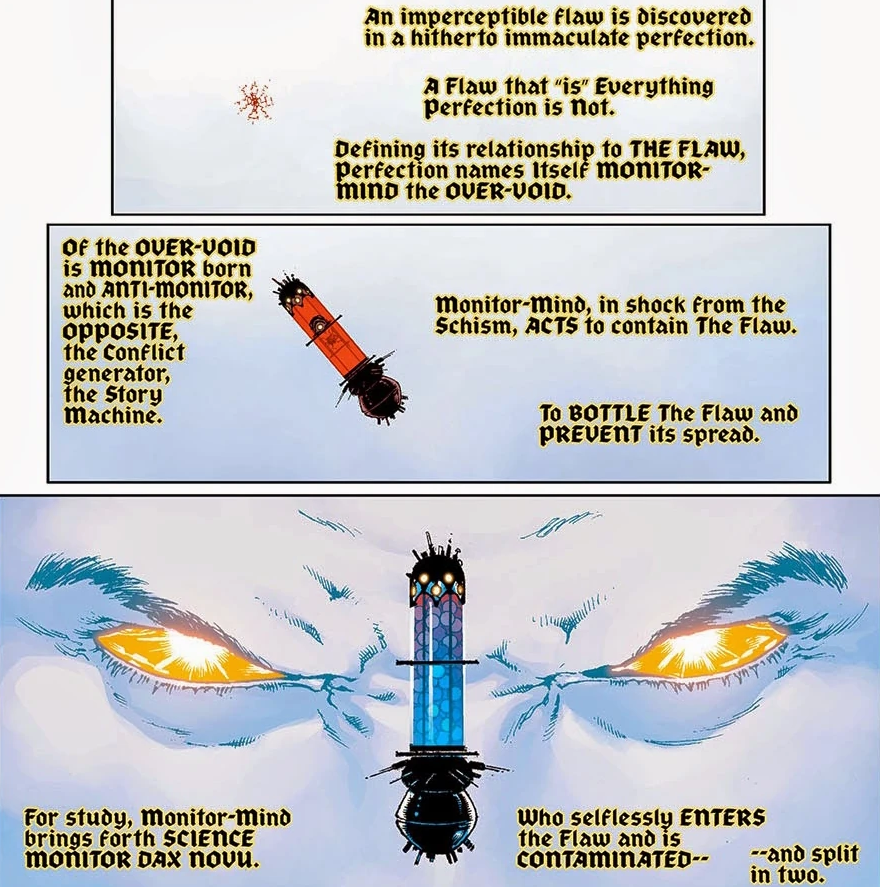IGN Comics: So that kind of answers my question, which is that the Monitors all seem like analogs for storytellers. There seems to be this never-ending cycle of the stories affecting the storytellers and the storytellers affecting the stories and on and on.
- 모니터는 이야기꾼들을 위한 아날로그처럼 보인다는 것이다. 이야기에 영향을 미치는 이야기와, 이야기에 영향을 미치는 이야기의 끝없는 순환이 있는 것 같아요.
Morrison: Yeah, it's a bit of that. It's also the idea that they're like angels as well. For me, the cool, essential idea of all stories being real creates this great cosmology to play with. It's the notion that the white page itself is a void, and in the context of the DC Universe, well that's God or The Source. In the white page, or the void, anything can happen, everything is possible. As I dug down closer to the very root of the activity I find myself engaged in as a career, I was thinking "what is the basis of the comic book story? What actually is it?"
- 대충 그렇습니다. 천사와 같다는 생각도 하죠. (...) 하얀 페이지 자체가 공허라는 개념이고, DC 유니버스의 개념에선.. 음.. 그게 신입니다.
더 소스. 흰 페이지, 혹은 공허에서는 모든 것이 일어날 수 있고, 모든 것이 가능합니다. (...)
In the case of comic book stories, it's the war between white page and ink. And who's to say that the page might want that particular story drawn on it? [laughs] What happens if the page is a bit pissed off at the story that's drawn on it? So I thought of the page as God. The idea being that the Overvoid – as we called it in Final Crisis - of the white page as a space is sort of God. And it's condensing stories out of itself because it finds inside its own gigantic white space, self-absorbed pristine consciousness, it finds this little stain or mark, this DC Multiverse somebody has 'drawn'. And it starts investigating, and it's just shocked with what it sees, with all the crazy activity and signifying going on in there. It then tries to protect itself from the seething contact with 'story' and imagines a race of beings, 'angels' or 'monitors' (another word for angel, of course) to function as an interface between its own giant eternal magnificence and this tiny, weird crawling anthill of life and significance that is the DC Multiverse.
- 만화책 속의 이야기의 경우, 페이지와 잉크 사이의 전쟁이죠. 그 페이지가 특정한 이야기를 그리고 싶어한다고 누가 말하겠습니까? 그 페이지에 그려진 이야기에 조금 화가 난다면 어떻게 될까요? 전 그 페이지를 신이라 생각했죠. 하얀 페이지의 초공백 (오버보이드).
(중략)
IGN Comics: [laughs] That's fascinating. How does the whole world of "Limbo" from Superman Beyond fit into the idea of the white page as God?
- 슈퍼맨 비욘드의 림보라는 세계가 신이라고 하는 백지라는 개념에 맞을까요?
Morrison: Limbo is what's been erased, isn't it? It's literally the characters that are almost forgotten. Almost whited-out. It's the characters that have been dumped from the continuity for one reason or another. When I visited the idea in Animal Man back in the eighties, most of those characters were forgotten sixties characters. But now, the place is populated by these nineties Blood Pack and Hero Hotline guys! I've just always loved it as a concept. In the case of Superman Beyond, which was like a Yellow Submarine, Jason of the Argonauts tale, I wanted to take my super-Argonauts to that place at the very edge of art where all these forgotten ideas live. The last outpost of the DCU proper before the archetypal Monitor World and the Overvoid.
- 림보는 지워진 것들이죠, 그렇죠? 말 그대로 거의 잊혀진 캐릭터들입니다. 화이트 아웃이죠. 이런저런 사정으로 연속성에서 버려지는 캐릭터들입니다.
(중략) 전형적으로, 모니터 월드와 오버보이드 이전. DCU (DC 유니버스)의 마지막 전초 기지인 셈이죠.
https://www.ign.com/articles/2009/02/03/inside-the-mind-of-grant-morrison
모리슨 형..... 제발 살려줘
뭔 소리하는 건지도 모르겠어...








 추천
추천 조우텐치
조우텐치